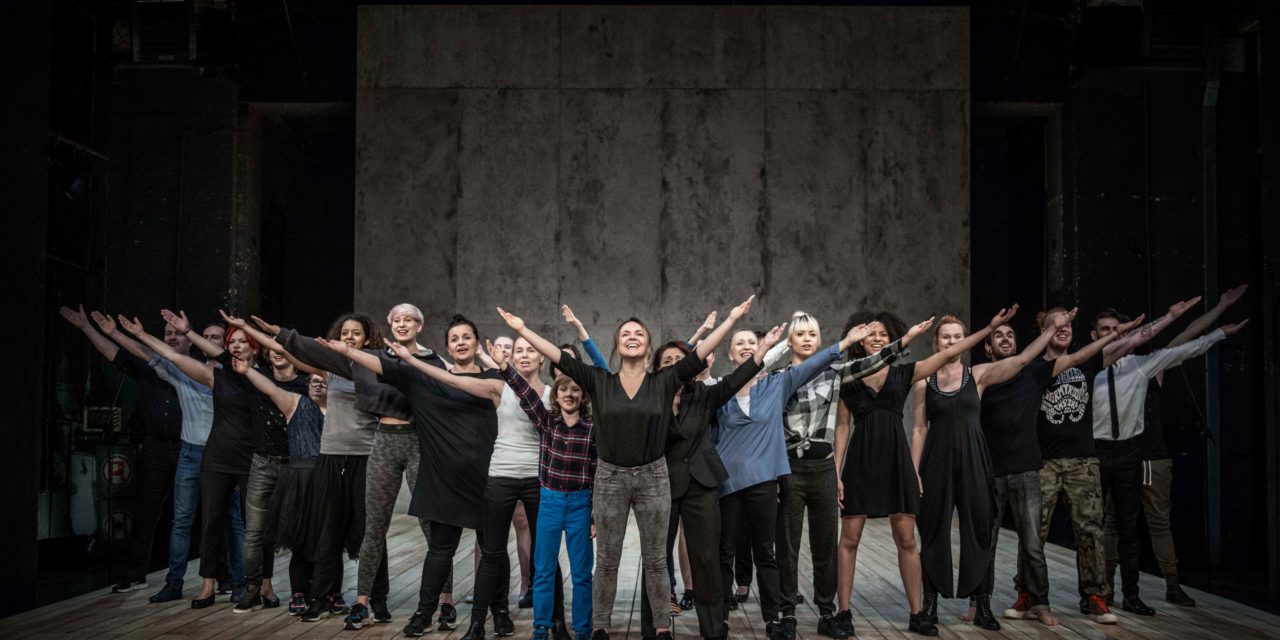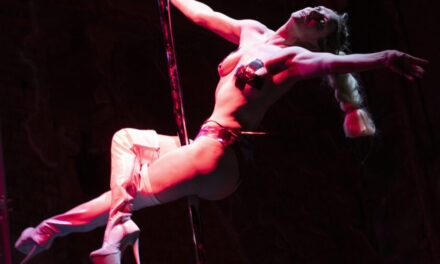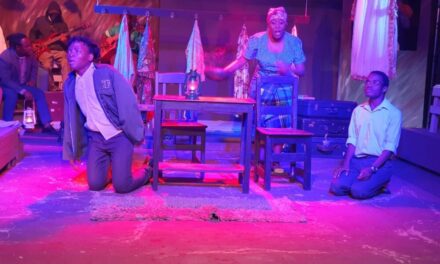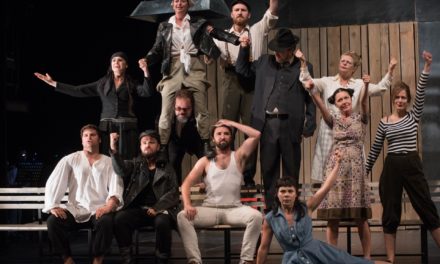The chorus, as Nietzsche states in The Birth Of Tragedy, “can only be understood as the cause of tragedy and of the tragic itself,” and “tragedy is originally only ‘chorus’ and not ‘drama.’” Marta Górnicka embarked on her audacious project The Chorus of Women in 2009. Supported by the Zbigniew Raszewski Theatre Institute in Warsaw, she found a solid laboratory in which to experiment and develop her modern tragic chorus. Górnicka made an open casting call to the public, attempting to diversify the chorus as much as possible regardless of age, profession or musical experience. The description of the project immediately caught people’s attention outside hermetic theatre circles and attracted more than 130 women from different places and backgrounds to the audition:
Listen to the chorus
As it spits sand lingering in the throat
As it takes the floor
As it constructs the Tower of Babel
Who is the chorus?
Modern drama excluded it, dumped sand on it and sentenced to silence
Today THE CHORUS OF WOMEN wants to regain
To create voice

Hymn To Love, directed by Marta Gornicka, at Divine Comedy Festival 2017. Photo credit: Magda Hueckel.
As ambiguous and poetic as it might sound, the description touches the very essence of the modern chorus that Górnicka envisions, and of the original tragedy over whose tomb Nietzsche mourned. Since the ancient chorus has died in modern theatre and nobody knows how it operated in ancient Greece, G.
The Chorus of Women aims to restore its political power through its musicality. For Górnicka, theatre has lost its choral tradition, which carries a revolutionary power that can destroy or transform rigid patriarchal systems from within. She explains: “Contemporary theatre deprived of the chorus seemed to me dead. Based on an individual, it deprived itself of a certain dimension of tragedy, it ceased to communicate with the audience.” It is worth noting that Greek tragedies have strong political references and commentaries. This political influence of the chorus is empowered by the intoxicating power of Dionysian music, which also enables the possibility of true catharsis. Górnicka also attempts to restore “the totality of theatrical experience,” which corresponds to the transcendent experience Nietzsche describes through music and songs to approach the original Unity which has long been separated from our individualized, socialized and constructed daily life.
Górnicka’s mission to resurrect the tragic chorus on the modern stage has double meanings. On the one hand, it tries to restore the ancient born-of-music tragedy, which has been repressed and excluded in theatre history since the rise of Socratism and Euripidean new tragedy, which then ushered in the era of the dominance of logic, dialectic language, and knowledge as the sole foundation of virtue. “Modern drama excluded it [the chorus], dumped sand on it and sentenced [it] to silence,” as she describes in her statement. The silenced chorus needs to find a way to reenact its contemporary incarnation. On the other hand, Górnicka tries to liberate another gagged, repressed group voice: women’s. As she claims: “We have to restore women to the chorus. The chorus of women will shout, whisper and sing. It will treat words as music. It will change the language into voice, it will initiate its subversive force.” By musicalizing words and actors’ bodies into a strictly rhythmic composition, Górnicka deconstructs linguistic connotations and disrupts the natural flow of the audience’s comprehension of meanings. The Chorus of Women, therefore, is a doubled restoration of two silenced voices—one theatrical, the other socio-historical.
In 2009, Górnicka auditioned and selected 28 out of 130 women and began to hold intense vocal/movement workshops in January 2010, officially starting her first choral project. As mentioned, Górnicka did not choose solely professional actors and singers. Instead, the Chorus of Women is a hodgepodge of women of different ages, professions, and levels of musical background.
Hymn To Love, as opposed to the original Chorus of Women with an all-female cast, comprises men and women, adults and minors, professionals and amateurs, senior citizens and adults with Down syndrome. Górnicka is known for her libretti, hodgepodges of classical texts, slogans, recipes, and clichés from different eras and socio-historical contexts. In Hymn To Love, she composes a “National Songbook” out of the national anthem, marches, patriotic songs, religious hymns, and folk songs. For Górnicka, the meaning of Chorus has changed completely over the years. “I want to show the monstrosity of this mechanism,” says Górnicka in our interview.
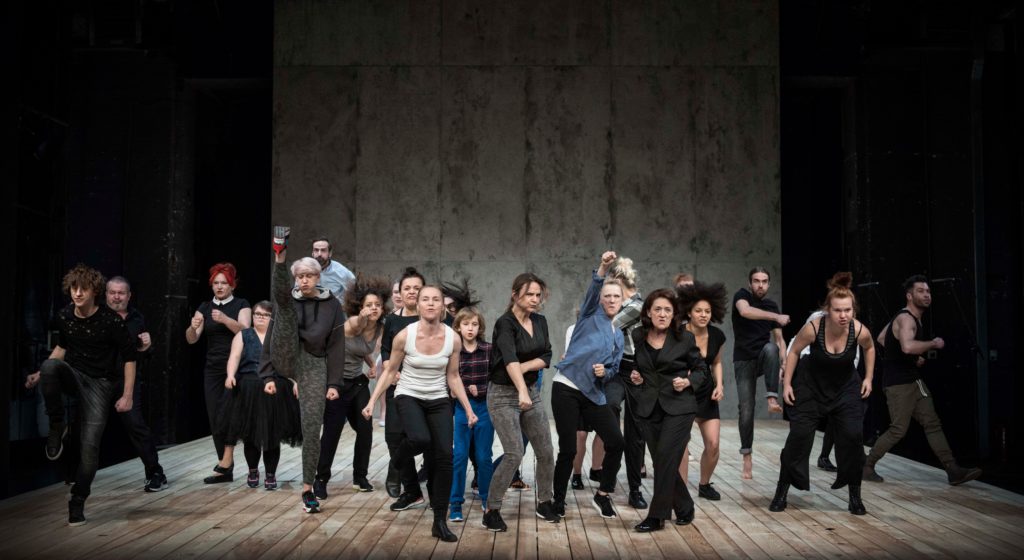
Hymn To Love, directed by Marta Gornicka, at Divine Comedy Festival 2017. Photo credit: Magda Hueckel.
The Chorus speaks and moves in a strictly rhythmic form. Górnicka is always physically present for the performance, conducting the chorus in the theatre, as a haunting Kantorian figure. Musicalization becomes an effective weapon for attacking presumptions and established rules, and for escaping from the linguistic maze. In one of her interviews, Górnicka explains how she takes advantage of language and breaks it down from within: “Musicality is a gateway for transgression. I like Roland Barthes’ saying that ‘language rustles at the edge of meaning.’’’ The libretto also includes fragments of interviews with terrorists (Osama Bin Laden and Anders Breivik) and the European Declaration of Independence. Obliterating and altering their original meanings through musicalization and juxtaposition, Górnicka violently and fearlessly attacks the rapidly increasing sentiments of hatred, xenophobia, and nationalism against minorities and refugees through this monstrous choir she creates. The dynamic between Górnicka and the Chorus is ever-evolving—sometimes the director seems to be fighting against the Chorus with difficulties, sometimes the Chorus seems to be completely submissive under her total control, representing how the political discourses have shaped a blind, acquiescent societal collective. The Chorus is highly self-referential. As Górnicka claims, “the form itself communicates and embodies the meanings.
In one scene, the Chorus repeatedly chants Nazi jargon: “No nation but ours will reproduce here. We say bye to all other nations. We’ll throw them in the oven; we’ll give them hell.” And then, on top of this repeated political jargon, the Chorus chants something even more terrifying: “We have nothing to talk about. This has nothing to do with us. Wrong community of values. No platform.” The Chorus’s diversity is negated at this moment. A diverse collective cannot resist the power of homogenization. No platform for otherness. No platform for divergence. No platform for resistance. No platform for individual qualities. Górnicka exposes the formation and vulnerability of an imagined community.
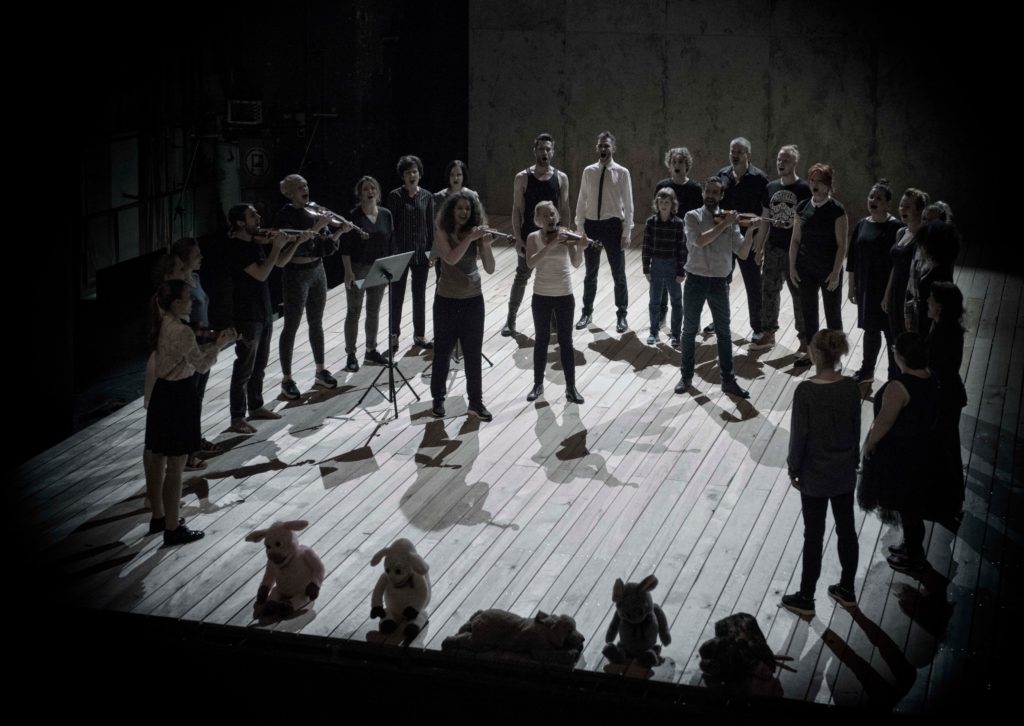
Hymn To Love, directed by Marta Gornicka, at Divine Comedy Festival 2017. Photo credit: Magda Hueckel.
The fact that this performance was included in the program for Divine Comedy 2017 is significant. Górnicka has addressed her concerns about no longer being able to work in Poland because of governmental repression (she said she’s on the blacklist). Hymn To Love was staged on the main stage of the Old Theatre in Krakow, demonstrating the curator’s intention and effort to continue supporting artists who are not afraid of shouting out their anger and confronting the regime in their ways. The 2017 festival was themed “Theatre in Ruin.” Hymn To Love is one of the strongest pieces in a festival that strives to restore the political power of theatre from the ashes.
A special report on Divine Comedy Festival was prepared with support of the Adam Mickiewicz Institute – the national institution of the culture of Poland. To learn more about polish theatre go to http://culture.pl/en/category/performance
This post was written by the author in their personal capacity.The opinions expressed in this article are the author’s own and do not reflect the view of The Theatre Times, their staff or collaborators.
This post was written by Kai-Chieh Tu.
The views expressed here belong to the author and do not necessarily reflect our views and opinions.

